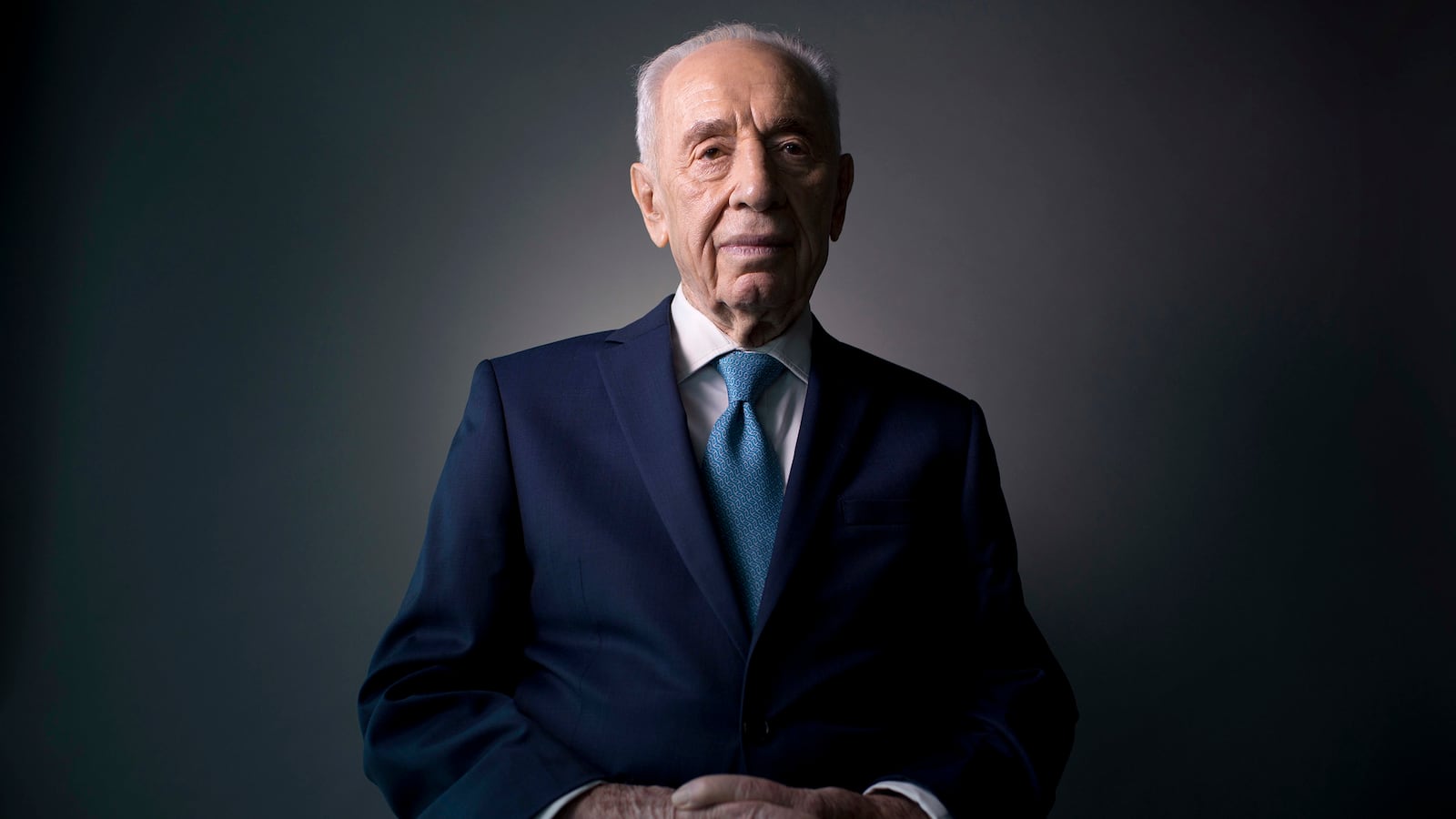Shimon Peres was the last of Israel’s founding fathers, a larger-than-life figure and Nobel Peace laureate who made history several times over. Yet his legacy lies in a shambles.
For someone who built the state of Israel, engineered its massive defense establishment, and twice led the country, Peres was not especially well liked. It was only in his last years, as president of Israel—a largely ceremonial post—that he settled into his role as elder statesman. And in comparison to the current generation of bombastic right-wingers and ineffectual liberals, Peres came to represent an earlier, more civil period in Israeli life.
But it is on the great campaign of Peres’s political career—the quest for peace with Israel’s neighbors and with the Palestinian people—that his legacy will inevitably be judged. And never has that dream seemed more distant than in 2016.
Israel is led by a coalition of conservatives and outright rejectionists. Its prime minister is the scion of a great Revisionist Zionist family, the bitter enemies of Peres’s mentor, founding Prime Minister David Ben-Gurion. On the other side of a negotiating table is a weakened Palestinian Authority, shot through with corruption, threatened by Islamist rejectionists, and undermined by Israel’s expansionist projects. And surrounding them both, chaos.
At the zenith of the Oslo peace process, shortly after the 1993 handshake between Palestinian leader Yasser Arafat and Israeli Prime Minister Yitzhak Rabin, Peres published a grand vision for the region, a book called The New Middle East. Even in the heady days of the 1990s (I was living in Jerusalem at the time), it was derided as naïve. High-speed trains from Cairo to Tel Aviv to Beirut. International cooperation on technology, water, and natural resources. Though Peres had been a ruthless pragmatist for over 40 years, covertly developing Israel’s nuclear program and cutting arms deals across the world, he seemed hopelessly hopeful, deluded, utopian.
And then he was betrayed.
First, a Jewish assassin killed Rabin on Nov. 4, 1995, egged on by rallies (attended by Benjamin Netanyahu) at which the former general was called a traitor and hanged in effigy. Peres became interim prime minister, but less than a year into his term, he lost an election to Netanyahu.
Then Arafat betrayed him, too. In 2000, with Labor back in power and outgoing President Bill Clinton eager to cement his own legacy, a final peace deal seemed closer than ever. But Arafat rejected everything the Israelis put forward, offered nothing in return, and even created new myths that undercut Israel’s historic claims to the land.
A few months later, Ariel Sharon took his infamous walk on the Temple Mount and the Second Intifada was ignited. With the exception of a few brief moments of hope, the last 15 years have been one long downward spiral of mistrust between Israelis and Palestinians. Most Israelis, even those who supported Rabin and Peres in the 1990s, gave up hope. Sharon’s and Netanyahu’s governments built their walls, Hamas took over Gaza, Israel’s settlements grew, and negotiations went nowhere.
Indeed, the tragic irony of Israel and Palestine is that everyone knows what the solution must look like, yet no one has the capacity to achieve it. And without a state of Palestine, there can be no New Middle East.
Perhaps it’s unfair to evaluate Peres’s legacy on these terms. After all, he lived so long of a life, dying at 93 after an incredible 70 years in public service, that one could just as well reflect on his accomplishments from the first half of his political life, rather than the second.
And for those three and a half decades, Peres’s legacy is an astonishing success.
Managing Israel’s Department of Defense in the 1950s, he deserves the primary credit for transforming Israel from a tiny, improbable experiment to a military powerhouse. He was a lead strategist in the preemptive strikes in 1967 that led to the most dramatic turnaround in Israel’s history, the Six-Day War. Despite his later reputation as a dove, it was Peres who was the hawk, while Rabin—his bitter rival in the 1970s—was more hesitant to use military force.
As a politician, however, Peres lost more than he won. “Mah—ani loozer?” he once asked when he was begged to take a back seat to other, younger politicians: What am I, a loser?
But, in part, he was. He lost several bids for Labor Party leadership. His rivalry with Rabin helped end Labor’s 30-year hold on power. He lost multiple elections. He joined coalitions with right-wing leaders who undermined him. He even lost the presidential election to a man who later served time in prison for rape. (Peres won that election a few years later.) It’s hard to think of another world leader who built so much, but lost so often.
That reputation really only lifted in Peres’s final decades. Long past the age when most men retire from public life, Peres remained on the front lines. I saw him speak many times in the 2000s and 2010s, often at conferences/centers/foundations/symposia he created, and he seemed to have finally found his métier. His sense of humor was as sharp as ever, and he took on the role as Israel’s wise grandfather. He still talked about peace, but also about Israel’s leadership in technology, cybersecurity, and a dozen other fields. And not just in generalities; Peres remained current on all of these areas and could plunge headfirst into a wonky discussion on any number of subjects.
Yet Peres also seemed to be living in a parallel universe, one in which the peace process was still a process, and the partners on both sides were still actual partners. I don’t think this was naïveté; Peres knew the political score as well as anyone. Rather, he doggedly maintained the crazy idea that peace was inevitable because it was the only way for Israel and Palestine to survive. There is no alternative, he said many times.
Alas, there is.






